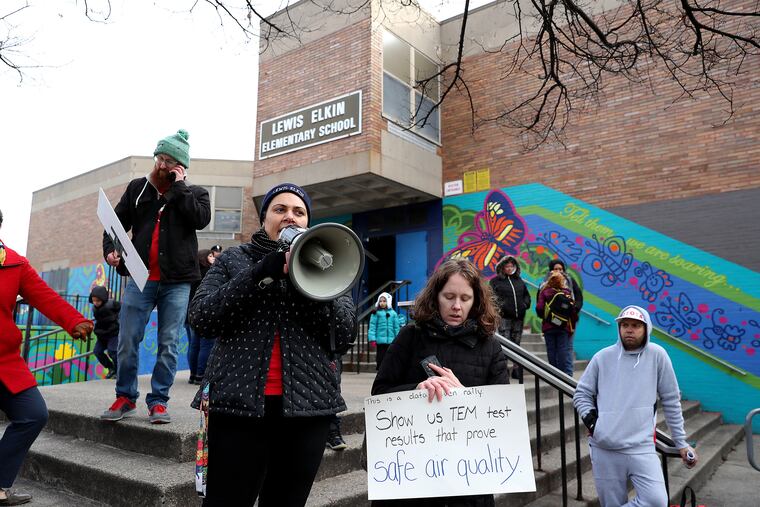Teachers are refusing to enter a Philadelphia elementary school because of asbestos fears
“It’s unfortunate that they would even want children to be put in there — into a place that’s not safe,” said Gerry Schmidt, a veteran Elkin teacher. “And if it’s safe, show us the proof, open the doors and we’ll get to work.”

Teachers and staff at an elementary school in Philadelphia’s Kensington neighborhood refused to enter their school building Monday amid fear that damaged asbestos has not been properly contained.
Dozens of them stood outside Lewis Elkin Elementary School, bundled up in jackets and hats against the cold, holding signs and occasionally chanting. They said they would remain outside until Philadelphia School District officials presented evidence that the building was safe.
Some parents left their children at home and stood with the teachers in solidarity. Others dropped their children off at the school at D Street and Allegheny Avenue, where administrators and some central office staff were present.
» READ MORE: ‘We’re struggling’: McClure Elementary parents cope with the practical fallout from Philly’s asbestos crisis
“It’s unfortunate that they would even want children to be put in there, into a place that’s not safe,” said Gerry Schmidt, a veteran Elkin teacher. “And if it’s safe, show us the proof, open the doors, and we’ll get to work.”
Staff at the K-to-4 school that serves about 650 students have been concerned about conditions in the building for months, said Schmidt — sometimes the heat doesn’t work, and some classrooms are sweltering. Vents are in poor condition. There are missing tiles in places where children walk and sit, with no word about whether the areas contain asbestos.
» READ MORE: How race, class, and privilege shape the asbestos crisis at two Philly high schools
After students left on Friday, staff were notified that there was a leak in a tank in the school’s boiler room, near the cafeteria, gym and schoolyard, and that the tank was wrapped in asbestos insulation. To fix the problem, the asbestos would have to be removed over the weekend.
Alarmed, teachers began to organize, asking for testing of the air quality when the work was complete. Parents were notified at 6 p.m. Friday after pressure from teachers, the staff said.
District officials promised the testing would be done, but as of Monday, the staff had received no information, and as a body, they decided they would not enter the building until they had proof.
» READ MORE: Asbestos in Philly schools demands action from district — plus the city and state | Editorial
“We’re not going anywhere,” Elie Gottlieb, a fourth-grade teacher, said at midmorning.
Monica Lewis, a district spokesperson, was not sure when testing would be complete, but said that the district’s focus was on the students, and that the children who did come to school were receiving instruction.
» READ MORE: Missed asbestos, dangerous dust: How Philadelphia’s Ben Franklin H.S. project went wrong
“If the school were not able to be occupied, we wouldn’t have children in the building,” Lewis said. “We are confident that there is no immediate hazard, no immediate danger.”
Lewis said Elkin staff are expected to be at school Tuesday. She said she could not discuss possible disciplinary consequences for staff who failed to come to work.
Cristina Garay, mother of a fourth grader, said she would stand with the teachers.
“As a mother, my worry is for my child,” Garay said in Spanish through a translator. “We’re only asking that the district provides a safe space for the education of our children.”
The district has been beset by an asbestos crisis all year. To date, six schools and an early childhood center have been closed, at least temporarily, because of significant asbestos problems. The environmental woes came after a career Philadelphia teacher was diagnosed with mesothelioma, a cancer linked to asbestos exposure.
The union has been full-throated in its criticism of the district’s handling of asbestos jobs in some schools.
But Jerry Jordan, the longtime Philadelphia Federation of Teachers president, suggested in a statement that Elkin’s teachers could have gone to work Monday.
“The scope and design of this work is appropriate, and we have no information at this time to suggest otherwise. Generally, work of this nature would not require building closure,” Jordan said, acknowledging the district’s track record of botching asbestos jobs makes staff wary.
Jordan faces a challenge to his PFT leadership from the Caucus of Working Educators, a group of union members concerned with social-justice issues that identifies with progressive groups that have seized leadership of the Los Angeles and Chicago teachers’ unions.
Some WE Caucus-aligned Elkin teachers said they were frustrated by the PFT’s response to the environmental concerns at their school, which several teachers said they found slow and inadequate.